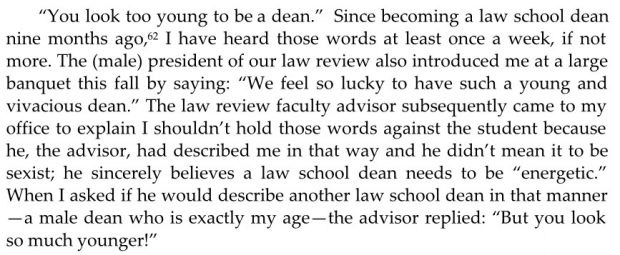Law School Dean Publicly Criticizes Student In Law Review Article Over A Sexist Remark
She publicly embarrassed a student, and she wasn't entirely wrong.

Dean Laura Rosenbury
UPDATE (9/6/16, 1:49 p.m.): Read on for a quick update to this story.
UPDATE (9/8/16, 11:30 a.m.): We have a new story with many more updates.
Judging by our tip line, emotions ran high on this one, and it’s no wonder when the leader of a public law school takes to a law review to cast aspersions on a student. Based on the uproar, the students and alumni are pretty upset over this episode, but in the rush to rip the dean’s indiscretion, people are missing — or affirmatively trying to obscure — the fact that she was right.

Legal AI: 3 Steps Law Firms Should Take Now
The dean of the University of Florida School of Law, Laura Rosenbury, published an article in the New England Law Review about women in the academy entitled “channeling Mary Joe Frug.” It’s all part of New England’s Mary Joe Frug memorial symposium. While discussing Frug’s role in her career, Dean Rosenbury included this passage:

And that opened up the floodgates here at ATL. Here are a couple of the tips we received:
* Maybe she doesn’t understand that her primary job as dean is to glad-hand rich and successful alumni for donations in order to keep the school going. Even worse, she decides to throw this year’s most-likely-to-succeed under the bus in order to shore up a third-tier law review article that no one would have read.
* Law dean penned an article basically slandering a beloved professor and a law student over the student’s having used the adjective “vivacious” while introducing her at a law school function. People are pissed off at how ridiculous this is.
Sponsored

Early Adopters Of Legal AI Gaining Competitive Edge In Marketplace

The Business Case For AI At Your Law Firm


Navigating Financial Success by Avoiding Common Pitfalls and Maximizing Firm Performance

Early Adopters Of Legal AI Gaining Competitive Edge In Marketplace
Social media was all abuzz about it too, with one Facebook post proclaiming:
The UF Levin College of Law and the University of Florida should be embarrassed that the Dean of their law school publicly calls out and identifies one of her own students and faculty members with the borderline slanderous accusation of sexism, against two of the most well-respected, tolerant and unprejudiced people at the school.
Let’s focus on the “well-respected, tolerant and unprejudiced people at the school” discourse. Why do people always assume “oh, he’s a good guy” is some sort of magic elixir that wards off racism and sexism? I guess it’s a blessing that Americans — by and large — have come to the consensus that prejudice is an evil so heinous that no person would ever want to be associated with it. It’s also a testament to how truly vile the most racist and sexist amongst us are that there’s such a knee-jerk resistance to suggesting that they could share anything in common with those troglodytes. But it’s also a sad and counterproductive mindset to think that racism and sexism simply cease to exist if everyone just agrees that prejudice is bad. There’s nowhere to go if conversations about prejudice are constantly derailed because folks (and the people defending them) refuse to brook any suggestion that they’ve done anything wrong.
Before the inevitable media hit job sullied the reputation of the term “micro-aggression,” it was actually starting to do the work of opening the door for the conversation, “Hey, I know you weren’t being all Hitler-y, but that remark you didn’t realize was sexist was still derogatory so you should stop doing it.” But of course that had to be ripped apart as PC hackery to protect the fragile egos of mostly white, mostly male people who can’t stomach being accused of trafficking in racism or sexism at any level.
And that’s what the “vivacious” term was. No one suggested that Dean Rosenbury go “barefoot and pregnant,” but that doesn’t mean this didn’t contribute to demeaning her career and position to use a word commonly understood to describe an overeager sorority president. But, based on the men and women writing in the social media threads out there, I fear more people want to bristle at the “attack” on the student and professor than engage in a thoughtful discourse about what happened. It’s really not the end of the world or “slander” to say that good people did something wrong. They didn’t stop being good people just because of this episode — they only stop being good people if they refuse to reflect on this episode.
Sponsored

Legal AI: 3 Steps Law Firms Should Take Now

Is The Future Of Law Distributed? Lessons From The Tech Adoption Curve
That said, there was really no excuse to bring the student publicly into this. Everyone can read a masthead. As someone who has done my share of calling out law student foibles, I’ve made it my policy to avoid anything that makes it child’s play to identify a lawyer based on something dumb they did as a student. Saying “I was once introduced at an event as ‘vivacious'” would make the article’s point just as effectively without putting a student in the pillory.
The lesson here is that nobody is perfect and nobody is completely without blame in this episode, and, not to sound like a self-help guru, that’s… OK. Everyone should just embrace their mistakes here and try to learn from them.
UPDATE (9/6/16, 1:49 p.m.): Since publication, multiple tipsters have written in to say that, from their understanding, the law review has lived up to these standards and took the incident as a teaching moment. So much so that they feel the outrage over the public nature of this rebuke is owed more to the fact that it comes months after the fact and long after the Florida Law Review had taken the appropriate steps to address the matter. As I said, this whole affair presents a two-way street for blame, and the student and the law review deserve kudos if they owned their share.
Joe Patrice is an editor at Above the Law and co-host of Thinking Like A Lawyer. Feel free to email any tips, questions, or comments. Follow him on Twitter if you’re interested in law, politics, and a healthy dose of college sports news.







